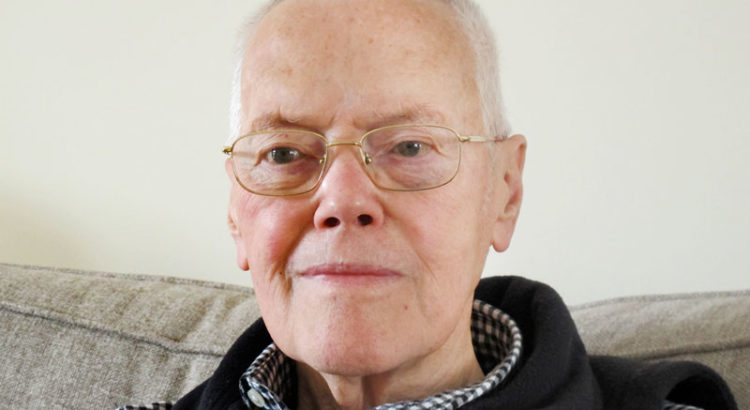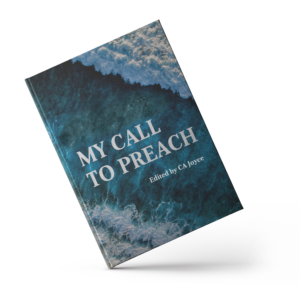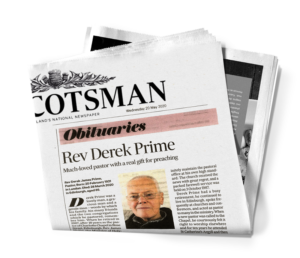When Derek Prime died on 20 March 2020, I was asked to prepare obituaries for The Scotsman, for his Cambridge College and for two evangelical monthlies. Because of the Coronavirus lockdown, my copy of his (fascinating) 1968 autobiography, My Call to Preach, was, along with all the other Charlotte Chapel records, inaccessible in the City of Edinburgh archives.
A search on the Internet brought up so few copies of the book for sale that it seems worthwhile reproducing the text here, followed by the obituaries in The Scotsman and the Emmanuel College magazine.
An interview with Derek Prime about his last published work, his own testimony on the eve of his eighty-second birthday and tributes by family and friends, are all available on the internet under Derek J Prime.
My Call to Preach
Click the button below to read excerpt from Derek’s fascinating life.
Scotsman Obituary
Click the button below to read the Scotsman Newspaper obituary.
Emmanuel College Obituary
Derek James Prime (1951) died on 28 March 2020.
We have received the following tribute from an Edinburgh friend, Ian Balfour.
Derek James Prime, M.A., S.Th., was born on 20 February 1931 in South Lambeth, London, the son of J. H. Prime, a Company Director. He attended Westminster City School. At the age of 15, he was baptized and received into membership of the Lansdowne Evangelical Free Church in West Norwood, near his home.
As many of the older men were away on military service, he had opportunities of speaking and preaching. One day his pastor asked him whether he had thought of the ministry. The conviction grew as opportunities for ministry arose during National Service with the Royal Scots Greys in Germany and even more after he was admitted to Emmanuel College in October 1951. He took History Part I in 1953 and then, as his sense of ‘call’ to the ministry deepened, changed to Theology and gained Part 1A in 1954.
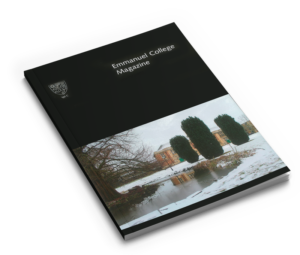 He recounted, with awe, one extra-curricular activity. A fellow-student, Michael Griffiths, President of the Cambridge Inter-Collegiate Christian Union, asked him to be secretary of its Mission Committee, and to plan a week-long university mission in November 1952. As well as the main meetings in Great St. Mary’s, the University Church, smaller events were arranged in every college. This involved an immense amount of secretarial work, meetings, correspondence, publicity, arranging accommodation for thirty assistant missioners and much more – all before the days of photocopying or email.
He recounted, with awe, one extra-curricular activity. A fellow-student, Michael Griffiths, President of the Cambridge Inter-Collegiate Christian Union, asked him to be secretary of its Mission Committee, and to plan a week-long university mission in November 1952. As well as the main meetings in Great St. Mary’s, the University Church, smaller events were arranged in every college. This involved an immense amount of secretarial work, meetings, correspondence, publicity, arranging accommodation for thirty assistant missioners and much more – all before the days of photocopying or email.
Great St. Mary’s was packed with students for the eight evening meetings – the last one overflowed into the choir stalls and the gallery staircases. The student newspaper, Varsity, called it a ‘highly successful’ mission. John Stott, the Rector of All Souls Church, Langham Place, London, gave the main talks, explaining the basic truths of Christianity, which became the substance of his book Basic Christianity in 1958.
During Derek’s last year of study in Cambridge he was Honorary Secretary of the Inter-Collegiate Christian Union. Friendships made in Emmanuel and throughout the CICCU lasted for the rest of his life.
The elders at Lansdowne Church encouraged his ‘call’, but suggested that he get some wider experience first. Accordingly, he taught history and religious knowledge for three and a half years, at Battersea Grammar School. At the same time he gained a Diploma in Theology from Lambeth (S.Th., Student of Theology.)
In 1955 he marri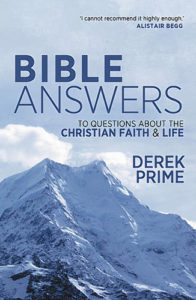 ed Betty Martin, whom he had met while they were teenagers at Lansdowne. During a pastoral vacancy in his own church, and a year after he had become an elder there, the congregation asked him to become their pastor and he was ordained in 1957. His theology was mainstream Evangelicalism, and his expository preaching was built on extensive reading. Inspired by reading about the founder of Emmanuel College in 1584, Sir Walter Mildmay, who was a Puritan, Derek developed a life-long love for, and admiration of, Puritan preachers.
ed Betty Martin, whom he had met while they were teenagers at Lansdowne. During a pastoral vacancy in his own church, and a year after he had become an elder there, the congregation asked him to become their pastor and he was ordained in 1957. His theology was mainstream Evangelicalism, and his expository preaching was built on extensive reading. Inspired by reading about the founder of Emmanuel College in 1584, Sir Walter Mildmay, who was a Puritan, Derek developed a life-long love for, and admiration of, Puritan preachers.
During his twelve years as pastor at Lansdowne Evangelical Free Church he published six children’s books, Tell me the Answer about – questions asked by children about the Christian faith – and three adult books, A Christian’s Guide to (1) Prayer, (2) Leadership (3) Questions on the Christian Faith answered from the Bible (Later called Bible Answers). He was actively involved in the Fellowship of Independent Evangelical Churches and was its National President for the year 1966.
In 1969 he accepted a ‘call’ to Charlotte Chapel in Rose Street, Edinburgh, and had eighteen fruitful years there. The Chapel was built to seat one thousand in the main auditorium, but following the start of Derek Prime’s ministry it was necessary to broadcast the Sunday morning service to an overflow meeting in the lower hall. For the children’s talk, he divided Pilgrim’s Progress into forty episodes, with flannelgraph illustrations for the pulpit blackboard, and captivated the attention of both children and adults by coming to a crucial point in the narrative and asking: ‘so what h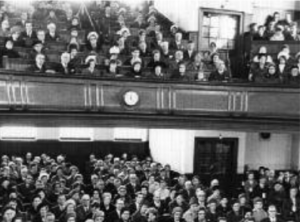 appened? – we’ll find out next week’. By the end of his first year in Edinburgh, pilgrim had reached the celestial city, so he followed Christiana’s Progress (pilgrim’s wife) and then John Bunyan’s third classic, The Holy War. By popular demand, he repeated the series several times.
appened? – we’ll find out next week’. By the end of his first year in Edinburgh, pilgrim had reached the celestial city, so he followed Christiana’s Progress (pilgrim’s wife) and then John Bunyan’s third classic, The Holy War. By popular demand, he repeated the series several times.
For the adults, his sermons took them through whole books of the Bible and the congregation were challenged by his practical applications and exhortations. He remarked, whimsically, that by doing this he could not avoid difficult passages, but had to apply them to contemporary issues.
Among ‘the multitude of things that he made better’, as a ministerial colleague put it when he retired in 1987, was pastoral care in the church. He is remembered as a lovely man, a gracious man and a gentle man. Remarkably, he could recall, after a service attended by one thousand people, which of the regular worshippers were not present, and if this continued he phoned or called or arranged a visit.
‘Home group meetings’ were almost unknown in Edinburgh in 1969, but they took off in Charlotte Chapel when Derek Prime divided the membership into twenty groups, more or less equal in number, on a geographical basis, to meet in homes during the week, for Bible study and prayer, under the leadership of an elder. He visited all the groups in rotation, and from time to time invited them to meet in the manse.
He entertained students from all over the world, keeping in touch with many after they returned to their own countries. He gave time to train six men for the ministry; after working with him for two years, they moved to pastorates of their own. Others in ministry throughout the world look to their time at Charlotte Chapel as the period in which a sense of call developed and looked to him as their exemplar of pastoral ministry.
He had a busy retirement; he continued to live in Edinburgh, spoke frequently at churches and conferences, and acted as pastor to many in the ministry. He wrote several new books, adding to the thirty-six already published. The best-known of them is On Being a Pastor: Understanding Our Calling and Work in 2004, expanded and reissued in 2013 jointly with one of his previous assistants, Alastair Begg. His final publication, in 2017, was A Good Old Age – an A to Z guide to Christian priorities for later life. An interview in which he talks about this book is available by typing his name into Google.
After a dinner in Edinburgh in October 2015, at which the Master of Emmanuel spoke, he wrote, in a typically charming thank-you note, that his years at Emmanuel were ‘one of God’s most gracious providences in my life and enduring friendships were made that have enhanced my life.’ Similarly, on his return from his last visit to Emmanuel, for a reunion dinner in September 2015, he recounted with delight his conversations with friends made over these years.
His retirement years were saddened by the death, from cancer, of his daughter Cilla in 2003 and his wife Betty in 2007. He leaves three married children, Esther Grant, Tim and Jonathan, eight grandchildren and nine great-grandchildren.
He preferred to conduct a ‘Thanksgiving Service for the life of …’ rather than the traditional ‘Funeral Service for …’. He had a gift for giving thanks for a life well lived, bringing comfort to the bereaved, expressing certainty in the resurrection, and encouraging faith in Christ, all in one service. He hoped that at the Thanksgiving Service for his life, his grandson, Paul, would sing his favourite hymn, which begins:
How sweet the name of Jesus sounds, In a believer’s ear,
It soothes his sorrows, heals his wounds, And drives away his fear.
At the time of writing this, the national emergency has delayed the opportunity for a public service.
